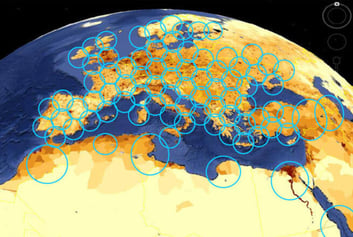 This morning, Bloomberg News pointed at a brand new article at BusinessWeek, one of their media properties. This is an excellent article that exposes the vulnerabilities when communications systems are not secure by design. It is an excellent wake-up call for your C-level execs and powerful budget ammo.
This morning, Bloomberg News pointed at a brand new article at BusinessWeek, one of their media properties. This is an excellent article that exposes the vulnerabilities when communications systems are not secure by design. It is an excellent wake-up call for your C-level execs and powerful budget ammo.
They started out with: "As Putin began his invasion of Ukraine, a network used throughout Europe—and by the Ukrainian military—faced an unprecedented cyberattack that doubled as an industrywide wake-up call. What they refer to is the Viasat hack. The KnowBe4 blog initially reported on this hack on March 24, 2022 here and in our CyberheistNews May 17, 2022 here.
The article continues to describe how a large number of Viasat customers lost connectivity. Here is a quote: "Viasat staffers in the US, where the company is based, were caught by surprise, too. Across Europe and North Africa, tens of thousands of internet connections in at least 13 countries were going dead. Some of the biggest service disruptions affected providers Bigblu Broadband Plc in the UK and NordNet AB in France, as well as utility systems that monitor thousands of wind turbines in Germany. The most critical affected Ukraine: Several thousand satellite systems that President Volodymyr Zelenskiy’s government depended on were all down, making it much tougher for the military and intelligence services to coordinate troop and drone movements in the hours after the invasion."
“Industry was caught flat-footed,” says Gregory Falco, a space cybersecurity expert who has advised the US government. “Ukrainians paid the price.” The attack was a wake-up call. “The war is really just revealing the capabilities,” says Erin Miller, who runs the Space Information Sharing and Analysis Center, a trade group that gathers data on orbital threats. Cyberattacks affecting the industry, she says, have become a daily occurrence. The Viasat hack was widely considered a harbinger of attacks to come."
For many end-users, the frustrating thing about the Viasat hack is that, unlike with a phishing attack, there was nothing they could have done to prevent it. But the Russians (this smells like GRU) would have to know a lot of detail about Viasat's systems to execute an attack like this. They probably had compromised the Viasat networks for months or years. And highly likely their initial attack vector was social engineering.
Send this link to your C-level execs, they are probably subscribers:
https://www.bloomberg.com/features/2023-russia-viasat-hack-ukraine/
 Security Awareness Training is critical to enabling you and your IT staff to connect with users and help them make the right security decisions all of the time. This isn't one and done. Continuous training and simulated phishing are both needed to mobilize users as your last line of defense. Request your one-on-one demo of KnowBe4's security awareness training and simulated phishing platform and see how easy it can be!
Security Awareness Training is critical to enabling you and your IT staff to connect with users and help them make the right security decisions all of the time. This isn't one and done. Continuous training and simulated phishing are both needed to mobilize users as your last line of defense. Request your one-on-one demo of KnowBe4's security awareness training and simulated phishing platform and see how easy it can be!




